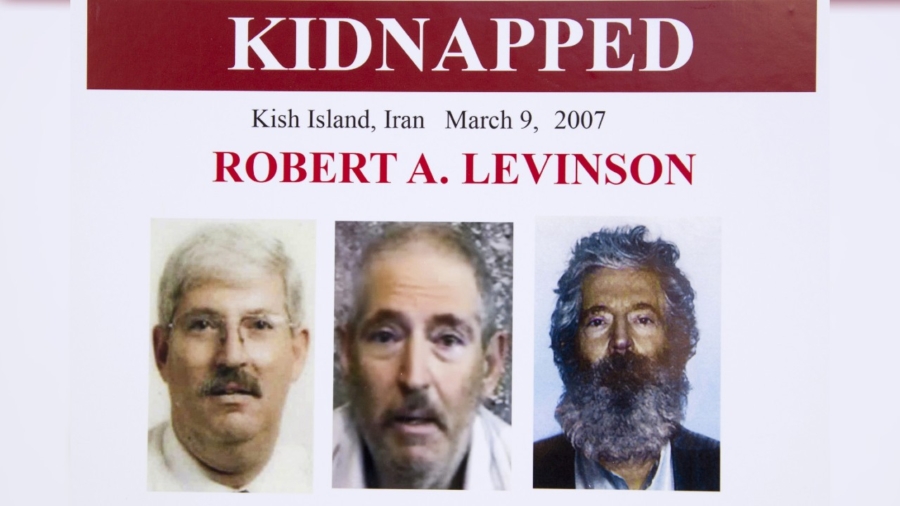DUBAI, United Arab Emirates—Iran on Nov.10 said an open Revolutionary Court case involving an ex-FBI agent who disappeared there in 2007 on an unauthorized CIA mission “was a missing person” filing, not a sign that the man was being prosecuted.
Foreign Ministry spokesman Abbas Mousavi’s comments come as a new Iranian acknowledgment of the case involving Robert Levinson renewed questions about his disappearance. The U.S. is offering $25 million for information about what happened to Levinson, who disappeared from Iran’s Kish Island on March 9, 2007. President Donald Trump meanwhile called for Iran to turn over Levinson, whom he described as “kidnapped.”
Speaking to journalists, Mousavi said Levinson “has no judicial or criminal case in any Islamic Republic of Iran court whatsoever.”
“It is normal that a case is opened like it’s done for any missing people anywhere in Iran,” Mousavi said.
However, Iran only acknowledged it’s Revolutionary Court had an open case on Levinson in a filing to the United Nations. The Associated Press obtained a copy of a U.N. report on the acknowledgment Saturday.

Iran’s Revolutionary Court typically handles espionage cases and others involving smuggling, blasphemy, and attempts to overthrow its Islamic government. Westerners and Iranian dual nationals with ties to the West often find themselves tried and convicted in closed-door trials in these courts, only later to be used as bargaining chips in negotiations.
For years, U.S. officials would only say that Levinson, a meticulous FBI investigator credited with busting Russian and Italian mobsters, was working for a private firm on his trip.
In December 2013, the AP revealed Levinson, in fact, had been on a mission for CIA analysts who had no authority to run spy operations. Levinson’s family had received a $2.5 million annuity from the CIA in order to stop a lawsuit revealing details of his work, while the agency forced out three veteran analysts and disciplined seven others.
Since his disappearance, the only photos and video of Levinson emerged in 2010 and 2011. He appeared gaunt and bearded with long hair. He was wearing an orange jumpsuit similar to those worn by detainees at the U.S. prison at Guantanamo Bay.
Iran, for years, has offered contradictory statements about Levinson. His family is now suing Iran in U.S. federal court, alleging the Iranian government kidnapped him.
A senior State Department official said the U.S. had not been informed of any change in that position. However, the official, speaking on condition of anonymity due to the sensitivity of the case, said the U.S. had reached out “through intermediaries” to Iran to see if the statement represented a change in Iran’s stance. The official said there had not yet been a response to the inquiry.
The official would not say who the intermediaries are, but U.S. interests in Iran are handled by Switzerland. Successive U.S. administrations have used the Swiss as their main interlocutor with Iranian authorities in cases where Americans have gone missing or been detained in Iran.
Brian Hook, the U.S. special envoy for Iran, has raised Levinson’s case, as well as those of other Americans, with Iranian officials in the past. Robert O’Brien, before he became Trump’s national security adviser, had made Levinson’s case a priority when he served as the special representative for hostage affairs.
Early Monday, Trump brought up Levinson’s case on Twitter.
“If Iran is able to turn over to the U.S. kidnapped former FBI Agent Robert A. Levinson, who has been missing in Iran for 12 years, it would be a very positive step,” Trump said.
The president did not elaborate, though he seemed to link Levinson’s case to Iran’s nuclear program. He pulled the U.S. last year unilaterally out of Iran’s 2015 nuclear deal, which saw Tehran limit—but not stop—its enrichment of uranium in exchange for the lifting of economic sanctions.
Trump tweeted: “At the same time, upon information & belief, Iran is & has been, enriching uranium. THAT WOULD BE A VERY BAD STEP!”
The 2015 deal allowed Iran to enrich uranium up to 3.67 percent and maintain a significantly reduced stockpile of low-enriched uranium, which stopped Iran from having a potential pathway to an atomic bomb if it chose to pursue one. Since Trump’s withdrawal, Tehran has begun enriching slightly above those limits, using prohibited advanced centrifuges and restarting enrichment at an underground facility. Iran says it wants to pressure Europe through those violations to offer it a way to sell its crude oil abroad despite American sanctions.
By Jon Gambrell


